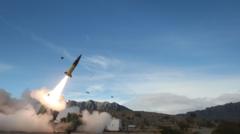In a significant escalation of the ongoing conflict, Ukraine conducted what it claims is the most extensive attack of the war, targeting multiple sites deep within Russian territory. This operation hit ammunition depots and chemical plants across various regions, some of which are situated hundreds of kilometers from the Ukrainian border. According to the General Staff of Ukraine's Armed Forces, this move underscores a strategic shift in their military capabilities.
Ukrainian security sources indicated that the strikes delivered a "painful blow" to Russia's operational capabilities, while Russian officials reported intercepting various missiles, including US-supplied Atacms and UK-made Storm Shadow cruise missiles. In response, Russia has pledged to retaliate, suggesting an intensification of military operations.
The attacks resulted in notable disruptions, as at least nine airports in central and western Russia ceased operations temporarily due to safety concerns. Schools in the southwestern Saratov region also closed to safeguard students amidst the threat of further strikes. Reports indicate that significant damage occurred in the border regions, notably Bryansk, with explosions recorded at a refinery and other military-related facilities.
Furthermore, Ukrainian strikes reportedly reached as far as 1,100 kilometers into Russian territory, particularly with drone attacks causing damage to industrial sites in the western cities of Engels and Saratov. Regional officials noted that educational institutions shifted to online learning following these incidents, as safety protocols were enforced.
In conjunction with Ukraine's offensive maneuvers, Russian forces launched dozens of drones targeting Ukrainian positions, prompting air raid alerts in various parts of Ukraine, including the capital, Kyiv. Ukrainian Air Force personnel reported successfully intercepting around 60 of the 80 drones deployed in this offensive.
With tensions escalating on all fronts, analysts speculate on the potential ramifications of these developments, especially considering the upcoming inauguration of President-elect Donald Trump in the United States. Trump's skepticism regarding US military involvement in the conflict and his expressed interest in negotiating peace with Russia casts uncertainty on the future geopolitical landscape in the region.
As the situation unfolds, it remains to be seen how diplomatic relations will navigate this intensified period of conflict and its implications for both Ukrainian and Russian interests on the global stage.
Ukrainian security sources indicated that the strikes delivered a "painful blow" to Russia's operational capabilities, while Russian officials reported intercepting various missiles, including US-supplied Atacms and UK-made Storm Shadow cruise missiles. In response, Russia has pledged to retaliate, suggesting an intensification of military operations.
The attacks resulted in notable disruptions, as at least nine airports in central and western Russia ceased operations temporarily due to safety concerns. Schools in the southwestern Saratov region also closed to safeguard students amidst the threat of further strikes. Reports indicate that significant damage occurred in the border regions, notably Bryansk, with explosions recorded at a refinery and other military-related facilities.
Furthermore, Ukrainian strikes reportedly reached as far as 1,100 kilometers into Russian territory, particularly with drone attacks causing damage to industrial sites in the western cities of Engels and Saratov. Regional officials noted that educational institutions shifted to online learning following these incidents, as safety protocols were enforced.
In conjunction with Ukraine's offensive maneuvers, Russian forces launched dozens of drones targeting Ukrainian positions, prompting air raid alerts in various parts of Ukraine, including the capital, Kyiv. Ukrainian Air Force personnel reported successfully intercepting around 60 of the 80 drones deployed in this offensive.
With tensions escalating on all fronts, analysts speculate on the potential ramifications of these developments, especially considering the upcoming inauguration of President-elect Donald Trump in the United States. Trump's skepticism regarding US military involvement in the conflict and his expressed interest in negotiating peace with Russia casts uncertainty on the future geopolitical landscape in the region.
As the situation unfolds, it remains to be seen how diplomatic relations will navigate this intensified period of conflict and its implications for both Ukrainian and Russian interests on the global stage.






















